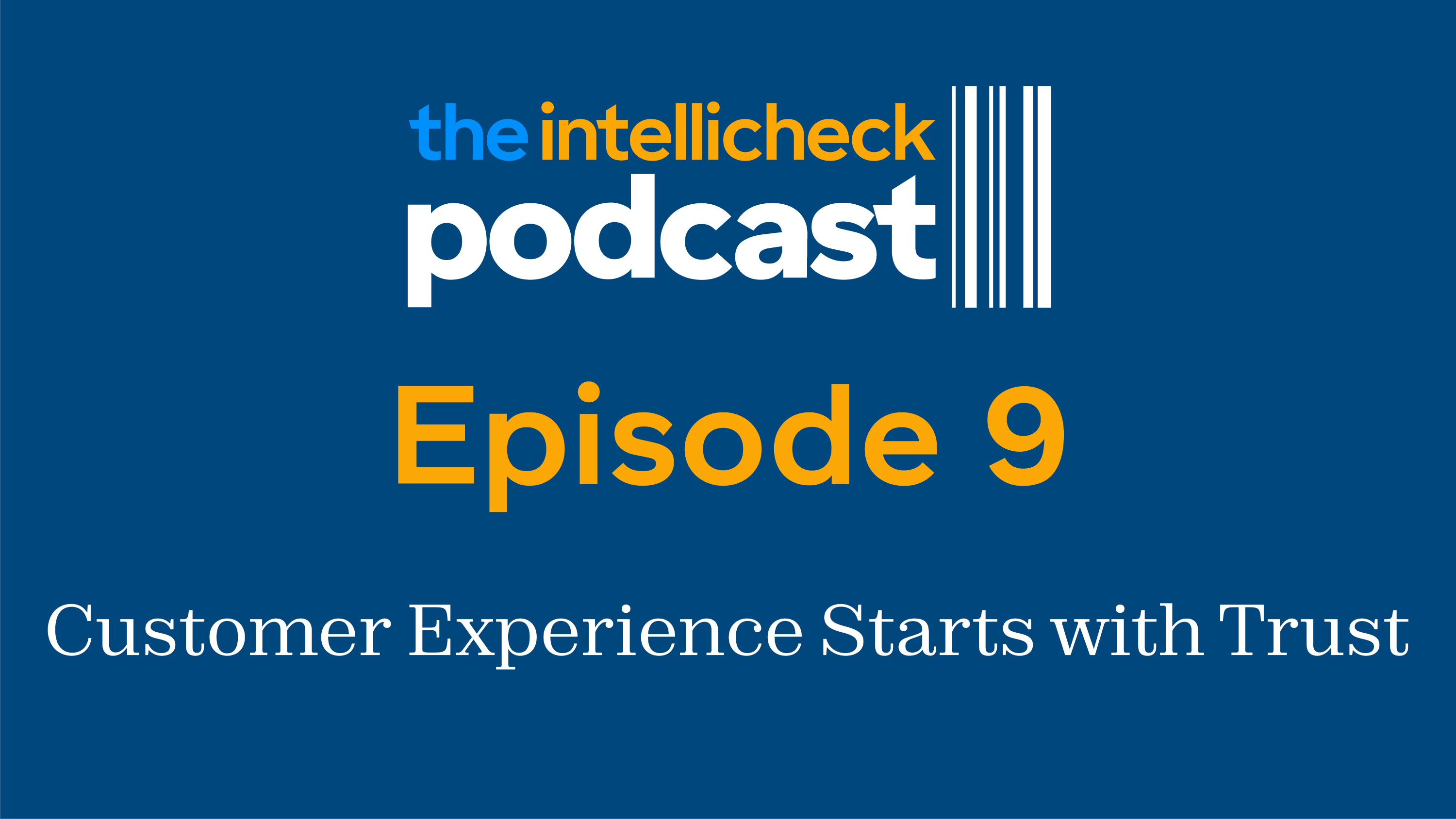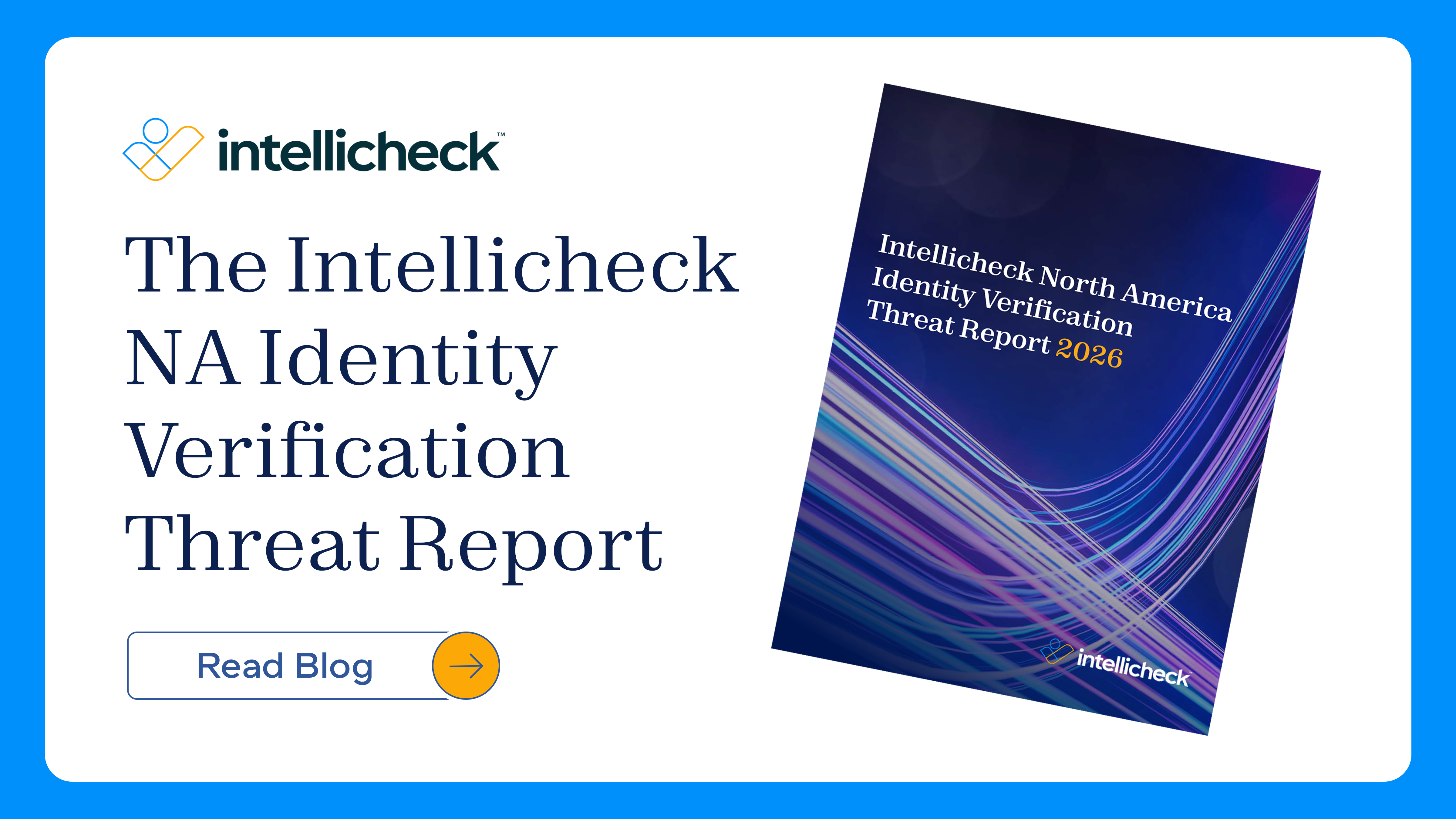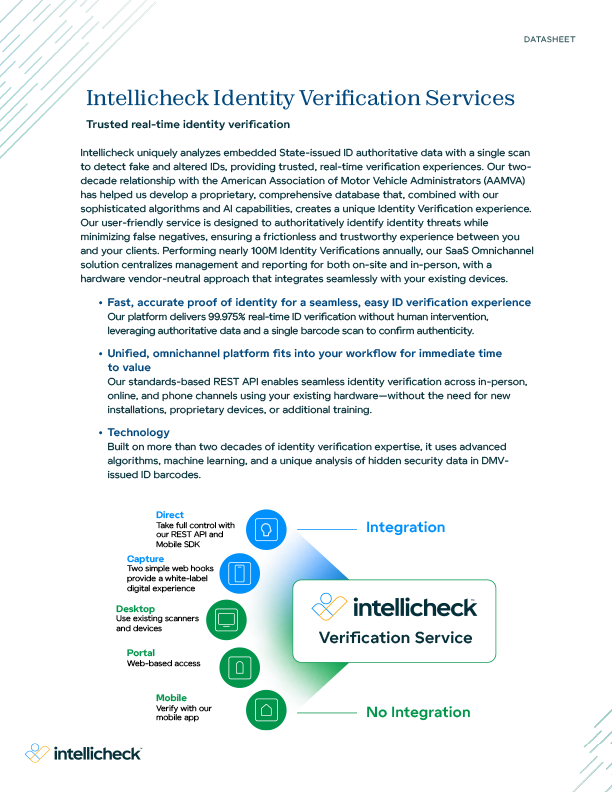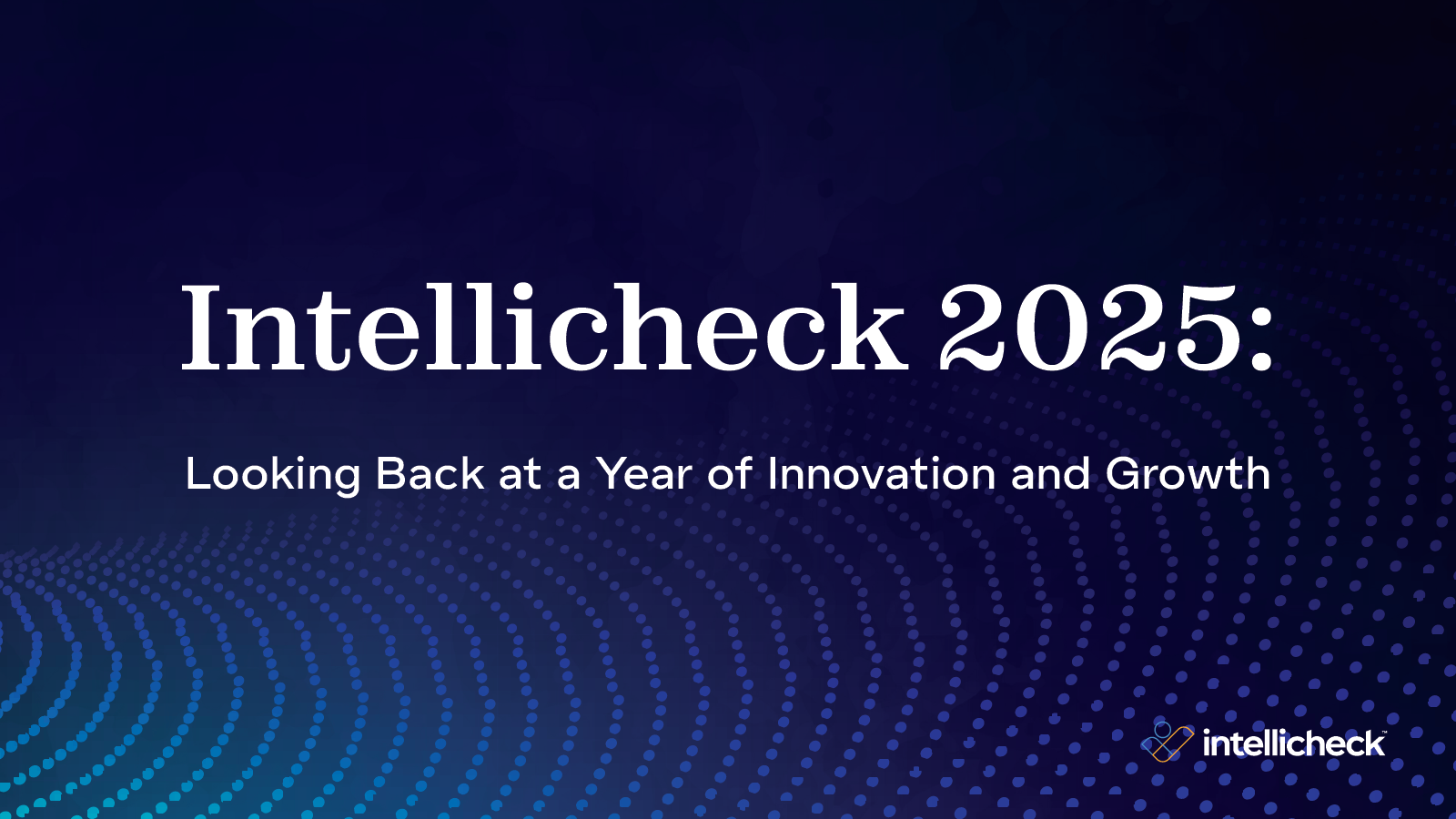This week's topic: customer service. With us this week is Sandra Bower, VP Customer Experience and Account Management.
Sandra also wrote a blog post on the topic: Customer Experience Starts with Trust: Why Identity Verification Matters More Than Ever.
Transcript
Bill Roth: Hello and welcome everybody to another episode of the Intellicheck podcast. This is the show where we delve into the news and issues around identity verification, identity fraud, and the tools needed to combat it. With us this week is Sandra Bauer, VP Customer Experience and Growth at Intellicheck. Welcome, Sandra.
Sandra Bower: Thank you, Bill. Great to be here. Thanks for having me.
Bill Roth: Sandra, as VP of Customer Experience, you've dedicated your career to building trust and loyalty between your company and its customers.
Today we'd like to discuss the lessons you've learned about building and growing trust as part of customer experience.
Let's start with that particular theme.
As we've talked before, we talk about trust. Why does the customer experience start with trust?
Sandra Bower: Yeah, thank you, Bill. Great question. So, unfortunately, I'm old enough to say I've been doing customer experience for companies now for over 25, almost 30 years, which doesn't tell much about my age, but customer experience and trust, I think this is true for all institutions in any company.
I always build everything and we look at everything from a business point of view with our customers on three core pillars.
One is integrity. So believing us that we're going to act fairly and be, have integrity with good intentions. The second one is dependability, that we follow through on what we say we're going to follow through on and confidence. Confidence to believe that we're actually going to do what they say. Right. So all of that builds trust and that's true even in your personal relationships. Right. You have to have integrity, dependability and confidence.
But when it comes down to business, when it comes down to B, to C, right. Business to consumer, and trying to build that base within those three core pillars, I think there's a customer experience and journey that can be driven through that, which is a seamless customer experience across all channels. So in person, digital, mobile, the omnichannel experience, making sure you have strong onboarding for your identity verification, because that's what we're talking about today. So reduce that customer friction.
And that customer friction can be taking too long to fill out an application or the account lookup, Avoiding account takeovers, a number of things that identity verification provides value to the business that keeps your customers secure. You want to lower fraud losses, fraud losses, not only for yourself, but for your consumer. And all of that increases long term trust and loyalty.
So that seamless across consistent experience of onboarding, that's really part of the integrity piece, right? That that's going to drive that integrity faster. Onboarding and reducing that customer friction is really about dependability, right? Through all omni channels. And then the confidence piece is really increased through preventing fraud losses only for yourself, but for your consumer, for your customer and making sure you have strong compliance alignment internally to help prevent that. And that's where the confidence really comes in through the fraud loss prevention as well as creating that long term trust and loyalty.
Bill Roth: So excellent response. Talk to me about what happens once the foundation of trust is established.
How as an institution do you maintain this high level of trust with your customers? It's a, it's a lot of work.
Sandra Bower: It is a lot of work. And identity verification can be challenging with your consumers. And here's why. When you go to buy something at retail store, you walk up to your bank teller and you want to make a transaction and they ask you for your id id and you're like why? Why do you need my id? Just let me do what I need to do. Right? And so the response that your employees give to your customer is critical, right? I would argue we see more of the well, because I was told to do so and if I don't identify your identity, I can't do your transaction for you versus reinforcing that trust with the customer every single time. You know, informing them, doing that sales enablement, doing that training of your people that are feet on the street, talking to your consumers every single day and making them understand that we are trying to protect their personal data. Right? Fraud is at an all time high with AI and selling of barcodes. Believe it or not, people out selling their barcodes, right? So somebody can sell in their barcode, put your information on the front and they're impersonating you and you don't even know it. The number of data breaches over the past several years, UnitedHealthcare, when they had their huge data breach a few years ago, driver's licenses, front, back, all your information is out there. If you were ever had UnitedHealthcare as health insurance, you're out in the dark wet, right? So I believe all companies are taking identity verification more seriously in their prod prevention strategy.
Because if we can verify identity as a first step, that prevents you getting all the way through the process or to the end. And we make sure not only protecting ourselves as the company, but more importantly you as our customer.
Bill Roth: That makes a ton of sense because it's sort of a two way.
I want you, my customer, to trust me, but I got to trust you as well. And so that shows sort of the value that identity verification sort of plays in this role.
But is that something that needs to happen. Do you think the trust needs to be mutual? Should banks or at least other environments, you know, what, what can additional, what additionally can be done to create an environment where the customer feels trusted by the bank or other financial groups?
Sandra Bower: Yeah, well, so yes, trust has to. That is what trust means. It's mutual. You can't have a relationship and you want a relationship with customers, not just a transaction. And so that's why the trust has to build mutually.
I think, you know, you strengthen their loyalty by them understanding the purpose of it, any verification and how it's protecting them and what you're doing to verify that data. I think that matters the communications. I think they see you as having a shared goal in their interest.
Right. And you mentioned banks and financial institutions, which is one of the primary verticals that we serve.
We have five out of the 12 largest banks in the United States. We run in more than 8,000 banks. So if we just focus on that alone, that's where your money goes.
That is hard earned money. Money is very, very, very personal. And you just assume that nobody's going to get access to your money at any time. And your bank has very stringent protocols that nobody can impersonate you and come get your money. That's what identity verification is all about.
So when you're asked to show your id, when you're asked to do that, that's your institution's way. We look at banks of showing the trust that they're building and how seriously they take their customer experience and how loyal they are to you as their customer.
Bill Roth: So as the saying goes, right, trust takes years to build because it's not just sort of a one and done sort of thing, but it takes years to build, seconds to break and forever to repair. You mentioned, I think a couple of breaches.
How are other ways that the trust is broken between financial institutions and their customers?
Sandra Bower: Well, broad and data breaches, which you already mentioned. We talked about poor identity verification or account security, right? Not having multi factor authentication to log in, not asking for your id.
Recently a friend of mine who runs her own company went to make a deposit at one of the largest banks in the United States. They didn't even ask for her id.
She goes, aren't you gonna ask me for id? They're like, no, we trust you.
And she was just kind of, she's like, well, thank goodness I'm making a deposit. Somebody's not in here trying to impersonate me and take my money.
So that was a little like, wait a minute.
I think the transparency and communication. I think it would behoove any company, including banks, to do campaigns to their customers going, look, we are instituting identity verification process into your experience.
And the reason we have this experience for you is to help protect your identity. Because we have seen, for instance, credit unions have experienced an average of 11% revenue loss in account takeovers.
Bill Roth: Wow.
Sandra Bower: Banks have a 7 1/2% reduction.
The Javelin Group back in 2024 published there was $15.6 billion loss in account takeovers. Nobody ever thinks about attack account takeovers.
So doing that omnichannel experience in person, online, digital or through your mobile, that is what's really critical.
So I might be rambling here, but that is what really matters is, sure, I think every company needs to do some type of a communication campaign to their consumers on why identity verification matters, how they're working to protect them and improve that security level with them, how.
Bill Roth: They're working to be trusted, how they're working to get better.
Sandra Bower: Exactly, exactly.
Bill Roth: Yeah, it sounds like a great program. So let's Talk specifically about Intellicheck and how Intellicheck can help businesses build trust between them and their customers.
Sandra Bower: Yeah. So here at Intellicheck we have the leading industry identity verification in the United States and North America. We were just awarded one of the leaders by IDC this past week. You can go find it out on our website and read the report on why identity verification actually matters. What makes us unique is the barcode on the back of your id. Not only does it have what's on the front of the ID, height, weight, hair color, eye color, etc. But it also has hidden security features in that we work exclusively with DMVs to understand what those security features are. So when we scan the back of that id, not only are we gathering that core data, but we know whether or not that barcode has the encryption that the DMVs have put in there.
That is important because a lot of other folks just do templating, which means they just compare the front of the ID to the back of the id.
Well, how well do you think that's going to work in today's world with AI, it's breaking pretty quickly.
So using that backup barcode another way, that's our base number, one way to secure the second level would be using what we call Doc Verify that compares what's on the back of the ID to the front of the id. So even if somebody sells their barcode out there and you get your fake ID for whatever reason, it's going to say, you know, the back of the ID scans it says Sandra Bauer, green eyes, blonde hair, but on the front of it it says Bill Roth, brown eyes.
Bill Roth: Right.
Sandra Bower: You immediately know that that's a stolen ID and you're not going to let something go through.
And then for digital through mobile or digital web online, we do selfies.
So we will do biometrics of your face compared to the picture on the ID and make sure that those match. So we have a number. Think of identity the theft as a number of hurdles, right? Those hurdles are very, very close.
And depending on the fraud strategy of each company or bank or institution, you implement different layers of fraud prevention. In that the first one is always identity verification and identity verification, we have another layers, right? Barcode, doc, verify, face verify, doc liveness. We have a number of levels and tiers that we can pull to help make sure that is solid.
So I really think that the strongest institutions treat identity verification not as a compliance requirement, but as a way to build and secure that trust with their customers. And if they think about it like that, that is why it's the first step in the process and the most critical in today's world.
Bill Roth: Makes a lot of sense. And folks, what you've heard about today is how Intellicheck can help increase the trust between you and your customers.
One thing I'll make is you also mentioned both the Javelin report and the IDC report. We'll make sure to have that data in the show notes.
So that's all the time we have today. Our guest, first time on the show, Sandra Bauer, Intellicheck VP of Customer Experience and Growth, has been my guest and we've been discussing the importance of building trust as part of the customer experience.
Sandra, thank you.
Sandra Bower: Thank you, Bill. Great to be here.
Bill Roth: That's all for this week. And thank you for listening to the Intellicheck podcast. See you next time and be safe out there.



.png)



